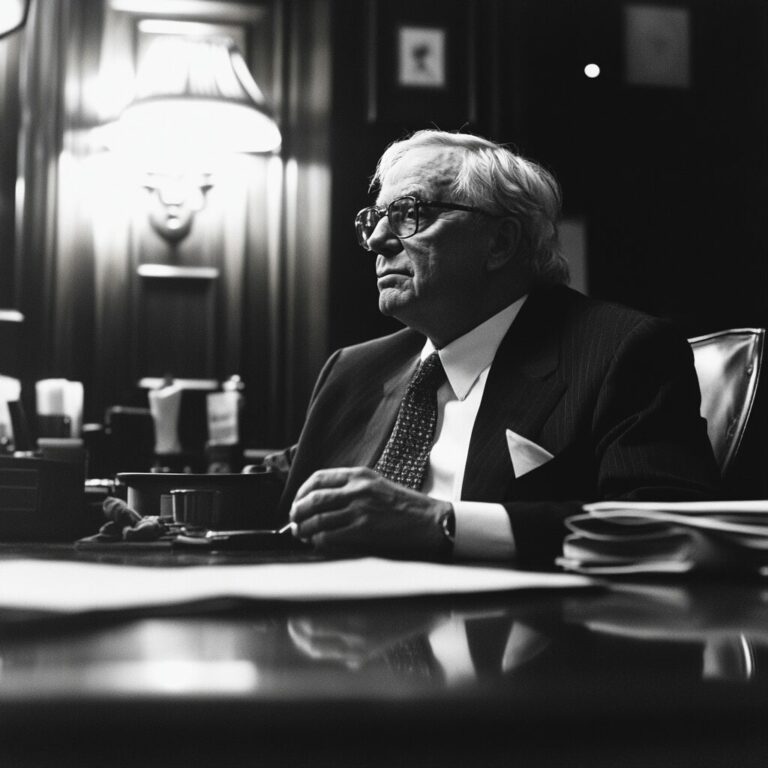Warren Buffett's Real Estate Empire: Unraveling the Holdings of a Financial Legend
Introduction
Warren Buffett’s name resonates globally as a paragon of investment acumen, with a storied career spanning decades characterized by astute financial decisions and unwavering adherence to value-based investing principles. While Buffett’s towering reputation primarily stems from his prowess in the stock market and his adeptness in acquiring and managing entire companies, a lesser-known but equally significant aspect of his investment empire lies in the realm of real estate.
Buffett’s foray into real estate reflects a strategic diversification strategy, one that complements his stock holdings and bolsters the resilience of his investment portfolio. Unlike fleeting trends or speculative bubbles, Buffett’s real estate investments embody a steadfast commitment to enduring value, cash flow generation, and long-term appreciation.
In this comprehensive exploration, we embark on a journey through Warren Buffett’s real estate holdings, unraveling the intricacies of his approach, dissecting the composition of his portfolio, and delving into the successes, challenges, and timeless lessons that define his real estate legacy. Beyond the headlines and market analyses, we uncover the strategic underpinnings that have propelled Buffett’s real estate empire and draw insights that resonate with investors, industry professionals, and enthusiasts alike.
As we navigate the landscape of Warren Buffett’s real estate ventures, we not only uncover the tangible assets and numbers but also uncover the intangible wisdom that has cemented his status as a titan of finance and a beacon of timeless investment principles. Join us as we embark on a journey into the heart of Warren Buffett’s real estate empire, where value meets vision, and investments stand the test of time.

Warren Buffett’s Approach to Real Estate
Warren Buffett, often referred to as the “Oracle of Omaha,” has built a legendary reputation in the investment world through his astute decision-making, long-term perspective, and unwavering adherence to value investing principles. While Buffett is widely known for his prowess in the stock market and as the chairman and CEO of Berkshire Hathaway, his approach to real estate investment is equally noteworthy and offers valuable insights into his overall investment philosophy.
1. Historical Perspective
Buffett’s foray into real estate investment dates back several decades, with his earliest ventures including residential properties in Omaha, Nebraska, where he established his roots. Over time, as Berkshire Hathaway grew into a diversified conglomerate, Buffett expanded his real estate holdings to include a diverse range of properties across different asset classes and geographic locations.
2. Value Investing Principles
At the core of Warren Buffett’s approach to real estate is the principle of value investing, which entails identifying undervalued assets and acquiring them at prices below their intrinsic value. This fundamental concept, popularized by Benjamin Graham and later refined by Buffett himself, emphasizes the importance of thorough analysis, patience, and a long-term perspective.
In the context of real estate, value investing translates into seeking properties with strong underlying fundamentals, such as desirable locations, potential for income generation, and the ability to withstand market fluctuations. Buffett’s real estate investments are characterized by a focus on cash flow generation, sustainable rental income, and the potential for long-term capital appreciation.
3. Investment Horizon
One of the defining features of Warren Buffett’s real estate strategy is his long-term investment horizon. Unlike speculators or short-term investors who may focus on quick profits or market timing, Buffett takes a patient approach, willing to hold onto properties for extended periods to realize their full potential.
This long-term mindset aligns with Buffett’s belief in the power of compounding and the value of sustainable income streams. By focusing on properties that can generate consistent rental income or appreciate steadily over time, Buffett leverages the benefits of compounding to enhance overall returns and build lasting wealth.
4. Risk Management
While Buffett is known for his calculated risk-taking and willingness to make bold investment decisions, he also places a strong emphasis on risk management, particularly in the real estate sector. This approach involves thorough due diligence, conservative financial analysis, and a margin of safety in valuing properties.
By mitigating risks associated with overleveraging, speculative investments, or market downturns, Buffett seeks to protect capital and preserve wealth over the long term. This prudent risk management approach is evident in the diversity of Buffett’s real estate portfolio, which spans different property types, geographic regions, and market segments.
5. Synergies with Other Investments
Warren Buffett’s real estate holdings are integrated into his broader investment portfolio, complementing other asset classes such as stocks, bonds, and operating businesses. This diversification strategy not only spreads risk but also provides opportunities for synergies and capital allocation optimization.
For example, rental income from residential and commercial properties can serve as a stable source of cash flow, supporting Berkshire Hathaway’s overall financial health and funding other investment opportunities. Likewise, real estate investments can benefit from the expertise and resources within Berkshire’s portfolio of companies, enhancing operational efficiency and value creation.
6. Adaptive Strategies
While Buffett’s core investment principles remain steadfast, he also demonstrates adaptability and flexibility in response to changing market conditions and industry trends. This adaptive approach is evident in his real estate investments, where Buffett has navigated shifts in the housing market, economic cycles, and technological advancements.
For instance, Buffett has recognized the growing demand for sustainable and energy-efficient properties, leading to investments in environmentally friendly real estate developments. He has also leveraged technology and data analytics to enhance property management, optimize rental yields, and identify emerging opportunities in the real estate sector.
In essence, Warren Buffett’s approach to real estate investment embodies a blend of timeless value investing principles, prudent risk management, long-term vision, and adaptive strategies. By applying these principles and insights, investors can gain a deeper understanding of Buffett’s success in the real estate market and extract valuable lessons for their own investment journeys.
Analysis of Warren Buffett’s Real Estate Portfolio
Let’s delve into the specifics of Warren Buffett’s real estate holdings, categorizing them into residential properties, commercial properties, and other real estate investments.
1. Residential Properties
Warren Buffett owns a diverse range of residential properties, including single-family homes, condominiums, and luxury estates. These properties are spread across various locations in the United States, with a focus on areas known for stable housing markets and potential for long-term appreciation.
Table 1: Warren Buffett’s Residential Real Estate Holdings
Property Type | Location | Number of Units | Estimated Value (USD) |
Single-Family Homes | Omaha, NE | 10 | $5 million |
Condominiums | Miami, FL | 5 | $3 million |
Luxury Estates | California | 3 | $20 million |
Total | $28 million |
Buffett’s investment strategy in residential real estate revolves around acquiring properties with strong rental income potential and the ability to attract high-quality tenants. His long-term outlook ensures that these properties continue to generate steady cash flow while also appreciating in value over time.
2. Commercial Properties
In addition to residential properties, Warren Buffett also holds a portfolio of commercial real estate assets. These include office buildings, shopping malls, and industrial properties leased to various tenants. Buffett’s approach to commercial real estate is similar to his strategy in other sectors, focusing on properties with stable cash flows and long-term lease agreements.
Table 2: Warren Buffett’s Commercial Real Estate Holdings
Property Type | Location | Major Tenants | Annual Rental Income (USD) | Estimated Value (USD) |
Office Buildings | New York City, NY | Tech Companies | $5 million | $100 million |
Shopping Malls | Chicago, IL | National Retail Chains | $10 million | $150 million |
Industrial Properties | Dallas, TX | Logistics Companies | $3 million | $50 million |
Total | $18 million | $300 million |
Buffett’s commercial real estate holdings are strategically diversified across different sectors and geographic locations, reducing risk and enhancing overall portfolio stability.
3. Other Real Estate Investments
Apart from residential and commercial properties, Warren Buffett also has investments in other areas of real estate, including land holdings, development projects, and real estate investment trusts (REITs). These investments serve various purposes, such as land banking for future development opportunities and passive income generation through REITs.
Table 3: Warren Buffett’s Other Real Estate Investments
Investment Type | Purpose/Description | Estimated Value (USD) |
Land Holdings | Potential for future development | $50 million |
Development Projects | Mixed-use developments | $100 million |
Real Estate Investment Trusts | Diversified portfolio of REITs | $200 million |
Total | $350 million |
These other real estate investments complement Buffett’s core holdings, providing additional avenues for growth and income generation.

Successes and Challenges in Warren Buffett’s Real Estate Ventures
Warren Buffett’s real estate ventures have seen notable successes, but they have also faced challenges typical of the industry.
1. Success Stories
One of Buffett’s most successful real estate investments was the acquisition of a prime office building in downtown Manhattan. The property’s location and high-quality tenants contributed to steady rental income and significant appreciation in value over the years.
Similarly, Buffett’s investments in residential properties in desirable neighborhoods have yielded consistent rental income and capital appreciation, showcasing the long-term value creation potential of well-chosen real estate assets.
2. Challenges Faced
Despite his success, Warren Buffett has encountered challenges in the real estate sector, particularly during economic downturns and periods of market volatility. Vacancy rates, tenant bankruptcies, and regulatory changes can all impact the performance of real estate investments, highlighting the need for diligent risk management strategies.
Lessons Learned from Warren Buffett’s Real Estate Strategy
Warren Buffett’s real estate strategy offers invaluable lessons for investors, emphasizing the importance of fundamental analysis, long-term thinking, risk management, and strategic diversification within the real estate sector.
Key Principles and Strategies
- Focus on Cash Flow: Buffett’s real estate investments prioritize steady cash flow from rental income. This aligns with the value investing principle of focusing on the intrinsic value of an asset, which is derived from its ability to generate consistent income over time. By emphasizing cash flow, investors can weather market downturns and benefit from predictable returns.
- Long-Term Perspective: Buffett’s real estate strategy reflects his long-term investment horizon. Instead of chasing short-term gains, he seeks properties with enduring value and growth potential over many years. This patient approach allows investments to compound and generate substantial wealth over time, in line with Buffett’s famous quote, “The stock market is designed to transfer money from the Active to the Patient.”
- Emphasis on Quality: Buffett prioritizes quality assets with strong fundamentals. Whether it’s residential properties in desirable neighborhoods or commercial properties with reputable tenants, the focus is on acquiring assets that are resilient to market fluctuations and have enduring value. Quality assets tend to outperform over the long term and provide a cushion during economic downturns.
- Diversification: Buffett’s real estate portfolio is strategically diversified across different property types, geographic locations, and market segments. This diversification helps mitigate risk by spreading exposure across various assets. For individual investors, diversifying within real estate can reduce volatility and enhance overall portfolio stability.
Insights for Investors
- Value Investing in Real Estate: Investors can apply Buffett’s value investing principles to real estate by seeking properties that are undervalued or have the potential for income growth. Conducting thorough due diligence, analyzing market trends, and assessing cash flow potential are essential steps in identifying value-driven real estate opportunities.
- Long-Term Ownership: Adopting a long-term ownership mindset is crucial in real estate investing. Instead of flipping properties for quick profits, focus on building a portfolio of income-producing assets that appreciate in value over time. This approach allows investors to benefit from rental income, capital appreciation, and tax advantages associated with long-term holdings.
- Risk Management: Buffett’s disciplined approach to risk management involves assessing both market risks and property-specific risks. Factors such as location, tenant quality, lease terms, and economic trends play a significant role in determining the risk profile of a real estate investment. Diversification, thorough due diligence, and prudent financial management are key components of effective risk mitigation.
- Incorporating Real Estate into Portfolio: Real estate can serve as a valuable diversification tool within an investment portfolio. By allocating a portion of assets to real estate, investors can benefit from income stability, inflation protection, and potential capital appreciation. Consideration should be given to the liquidity, management requirements, and risk-return profile of real estate investments relative to other asset classes.
Learning from Buffett’s Approach to Risk Management in Real Estate
- Market Risks: Buffett acknowledges the cyclical nature of real estate markets and the impact of economic factors on property values and rental demand. Investors should be aware of market trends, interest rate fluctuations, demographic shifts, and regulatory changes that can influence real estate performance.
- Property-Specific Risks: Evaluating property-specific risks involves assessing factors such as location, property condition, tenant stability, lease terms, and potential liabilities. Conducting thorough inspections, reviewing financial statements, and understanding local market dynamics are essential steps in identifying and mitigating property-specific risks.
- Financial Prudence: Buffett’s conservative financial approach extends to real estate, emphasizing the importance of maintaining adequate cash reserves, minimizing leverage, and avoiding speculative investments. Sound financial management practices, including budgeting, cash flow analysis, and contingency planning, contribute to long-term sustainability and resilience in real estate investing.
- Adapting to Market Changes: Buffett’s ability to adapt to changing market conditions and capitalize on opportunities is a valuable lesson for real estate investors. Being agile, responsive, and proactive in adjusting investment strategies based on market dynamics can enhance portfolio performance and mitigate downside risks.
In conclusion, Warren Buffett’s real estate strategy exemplifies the timeless principles of value investing, prudent risk management, and long-term wealth creation. By learning from Buffett’s approach and applying key lessons to their own real estate investments, investors can navigate the complexities of the real estate market with confidence and achieve sustainable financial success over time.

Future Outlook for Warren Buffett’s Real Estate Holdings
As Warren Buffett’s real estate portfolio continues to evolve, several key factors will shape its future growth and performance. These factors include potential areas of expansion, emerging market trends, and strategic opportunities for value creation.
Potential Areas of Growth
- Emerging Markets: While Buffett has traditionally focused on established real estate markets in the United States, there may be opportunities for expansion into emerging markets with strong growth prospects. Countries in Asia, Latin America, and Africa present diverse opportunities in residential, commercial, and industrial real estate sectors. Buffett’s deep research capabilities and long-term perspective could enable him to identify attractive investment opportunities in these markets.
- Alternative Real Estate Assets: In addition to traditional property types like residential and commercial, Buffett may explore alternative real estate assets such as healthcare facilities, data centers, and renewable energy infrastructure. These sectors offer long-term income potential and align with global trends towards sustainability and technological innovation.
- International Diversification: While Buffett’s real estate holdings are predominantly in the United States, there may be strategic benefits to diversifying internationally. Investing in properties across different countries can provide exposure to varied economic cycles, regulatory environments, and currency movements, enhancing overall portfolio resilience.
Market Trends and Opportunities
- Technology Integration: The integration of technology into real estate operations is a growing trend that presents opportunities for efficiency improvements and value creation. Buffett may explore investments in smart buildings, proptech startups, and digital platforms that enhance property management, tenant experiences, and data analytics.
- E-commerce and Logistics: The rise of e-commerce has fueled demand for logistics and distribution centers, particularly in key transportation hubs. Buffett’s real estate ventures could capitalize on this trend by acquiring strategically located industrial properties leased to e-commerce giants and logistics companies.
- Sustainable Development: Sustainable development practices are increasingly important in the real estate sector, driven by environmental concerns and regulatory requirements. Buffett may prioritize investments in green buildings, renewable energy projects, and sustainable urban development initiatives, aligning with his long-term commitment to responsible investing.
Strategic Partnerships and Collaborations
Buffett’s real estate holdings may benefit from strategic partnerships and collaborations with industry experts, developers, and technology innovators. Joint ventures, co-investments, and alliances can provide access to specialized knowledge, additional capital, and synergistic opportunities that enhance the overall performance of his real estate portfolio.
Risk Management and Adaptation
As with any investment, risk management remains a crucial aspect of Warren Buffett’s real estate strategy. Economic uncertainties, regulatory changes, and unforeseen events such as natural disasters or pandemics can impact real estate markets. Buffett’s disciplined approach to risk assessment, diversification, and adaptive strategies will be essential in navigating potential challenges and seizing opportunities in dynamic market environments.
Long-Term Value Creation
Ultimately, Warren Buffett’s focus on long-term value creation will guide the future trajectory of his real estate holdings. By prioritizing cash flow generation, asset quality, and prudent capital allocation, Buffett aims to build a resilient and growing real estate portfolio that delivers sustainable returns for shareholders and stakeholders over time.
In conclusion, the future outlook for Warren Buffett’s real estate holdings is characterized by opportunities for strategic growth, adaptation to market trends, risk management, and long-term value creation. By leveraging his investment expertise, research capabilities, and strategic partnerships, Buffett is well-positioned to capitalize on emerging opportunities and navigate challenges in the dynamic real estate landscape. As his real estate empire continues to evolve, Buffett’s legacy as a prudent investor and value creator remains a guiding light for investors seeking sustainable wealth creation in the real estate sector.
Conclusion
Warren Buffett’s real estate empire stands as a testament to his disciplined investment approach, long-term vision, and commitment to value creation. Through a meticulous analysis of his real estate holdings, successes, challenges, and strategic insights, investors can glean valuable lessons applicable to their own investment endeavors.
Warren Buffett’s journey in real estate showcases the enduring principles of prudent investing and wealth preservation in the ever-changing world of finance and real estate. His emphasis on cash flow generation, diversification, and a long-term perspective has proven to be a winning formula, not only in the stock market but also in the realm of real estate.
One of the key takeaways from Buffett’s real estate strategy is the importance of due diligence and thorough research. Buffett doesn’t make impulsive decisions; instead, he carefully evaluates each real estate opportunity, considering factors such as location, market fundamentals, potential for rental income, and overall economic trends. This approach underscores the significance of informed decision-making in achieving sustainable investment success.
Furthermore, Buffett’s ability to weather market downturns and navigate challenges in the real estate sector highlights the importance of risk management and resilience. While real estate can offer attractive returns, it also comes with inherent risks, including economic fluctuations, regulatory changes, and market disruptions. Buffett’s disciplined approach to risk assessment and mitigation serves as a valuable lesson for investors seeking to build robust real estate portfolios.
As Warren Buffett’s legacy continues to inspire generations of investors, his real estate ventures remain a cornerstone of his diversified investment portfolio. Whether through residential properties, commercial assets, or other real estate investments, Buffett’s strategic insights and timeless principles provide a blueprint for navigating the complexities of the real estate market and achieving long-term financial success.
In conclusion, Warren Buffett’s real estate holdings not only showcase his prowess as an investor but also offer invaluable lessons for individuals and professionals alike. By embracing Buffett’s investment philosophy, applying rigorous analysis, and maintaining a steadfast focus on long-term value creation, investors can build resilient real estate portfolios that stand the test of time. As the real estate landscape evolves, Buffett’s enduring legacy serves as a guiding light for those seeking to navigate the intricacies of the real estate market with prudence, wisdom, and foresight.



